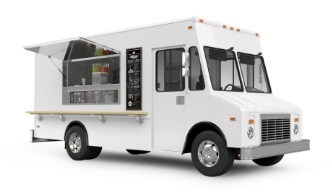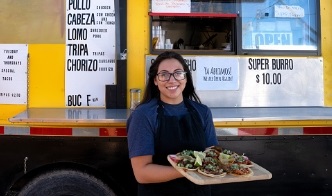|
 The Fresno County Environmental Health Consumer Food Program oversees the permitting and inspection of all mobile food vendors. But whether you’re looking to start a mobile food business or have already hit the ground running, you’re in the driver’s seat to your own success. This page contains all the information you need to comply with local permits and other requirements. The Fresno County Environmental Health Consumer Food Program oversees the permitting and inspection of all mobile food vendors. But whether you’re looking to start a mobile food business or have already hit the ground running, you’re in the driver’s seat to your own success. This page contains all the information you need to comply with local permits and other requirements.
Our Commitment
The team at the Environmental Health office can be your biggest ally in this process. We’re always available to help answer questions, consult with you about proposed changes, and occasionally offer onsite consultations. Our staff lives and works in Fresno County, so we want to see these types of businesses succeed and grow in a manner that protects our community’s health and safety.
|
Announcements
Annual Permit Notice for Mobile Food Vehicles (2024):
Please complete all required documentation, pay fees, and schedule an inspection appointment to obtain your permit to operate as soon as possible.
View Checklist(PDF, 2MB)
Health Permit Fees Notice (2024):
All permit fees must be paid BEFORE scheduling an inspection appointment. To do so, access your account online using the new CITIZEN PORTAL.
Instructions (English)(PDF, 706KB) Instructions (Spanish)(PDF, 341KB)
Required Updates to Fire-Suppression Systems:
An update to the California Retail Food Code, the California Mechanical Code, and the California Fire Code now requires mechanical exhaust ventilation and automatic fire-suppression systems to be installed over ALL mobiles equipped with cooking equipment that produces grease-laden vapors, including equipment on Mobile Food Facilities (MFF).
Learn More |
Terminology
Potentially Hazardous Foods
Food products that will support the growth of infectious or toxic bacteria. These items often require specific handling, cooking, or storage instructions for safety. Examples of potentially hazardous foods are meat, poultry, seafood, dairy products, cut tomatoes, cut melons, and raw seed sprouts. Learn more in CalCode Section 113871.
Non-Potentially Hazardous Foods
Food products that will not support the growth of infectious or toxic bacteria. Examples of non-potentially hazardous foods are chips, candies, and baked goods.
Mobile Food Vehicles
Any conveyance from which food or drinks are distributed to the consumer. This includes, but is not limited to, trucks, trailers, vans, carts (i.e., carts on caster wheels, push carts, tow-behind carts, etc.), and most any other motorized or non-motorized motorized or not motorized portable units. There are three classifications of food vehicles: Compact Mobile Food Operations (CMFO), Mobile Food Facilities (MMF), and Mobile Food Preparation Units (MFPU).
Note: Roll-off trailers are typically not considered food vehicles since they cannot visit their commissary at least once each operating day.
Compact Mobile Food Operation (CMFO)
A CMFO is a mobile food facility that operates from an individual, pushcart, stand, display, pedal-driven cart, wagon, showcase, rack, or other non-motorized conveyance. CMFO can be stored at your residence after an evaluation by the health inspector, however, produce must be washed and/or food must be prepared in a permitted permanent food facility. A CMFO can only conduct “limited food preparation,” as defined in California Retail Food Code 113818.
LEARN MORE ABOUT COMPACT MOBILE FOOD OPERATIONS (CMFO).
Mobile Food Facilities (MFF)
A MFF can sell prepackaged foods and unpackaged potentially hazardous foods. Examples would include chips, candy, churros, shaved ice, bottled drinks, etc. Vehicles, food, equipment, or utensils used for retail operations may not be stored, used, prepared, or serviced at private homes. A MFF can also engage in “Limited Food Preparation.”
LEARN MORE ABOUT MOBILE FOOD FACILITIES (MFF).
Mobile Food Preparation Units (MFPU)
A MFPU is a fully enclosed vehicle with cooking, hot holding, mechanical refrigeration equipment, and electrical generator. All food preparation must be done on the vehicle or at commercial kitchens permitted as commissaries. Vehicles, food, equipment, or utensils used for retail operations may NOT be stored, used, prepared, or serviced at private homes.
LEARN MORE ABOUT MOBILE FOOD PREPARATION UNITS (MFPU).
Commissary
All mobile food vehicles must operate from a commissary and visit the commissary at least once each operating day. A commissary is a currently permitted food facility that is capable of and has agreed to let food vendors use their facilities for the storage, servicing, and cleaning.
Vehicles, food, equipment, and utensils used for MFF and MFPU operations may NOT be stored, used, prepared, or serviced at private homes.
Commissaries are where food vendors…
- Park their vehicle or cart during non-operating hours
- Empty wastewater tanks into a sewer connection
- Fill freshwater tanks from potable water supply
- Clean the vehicle inside and out
- Service or maintain vehicle’s food equipment
- Obtain ice (Note: Ice for consumption must come from indoor ice machines at your commissary or to be purchased from an approved source)
- Store food and related supplies
- Supply food products (food vendors must obtain food from approved sources only)
- Use of utensil washing and food preparation facilities
Step-by-Step Guide to the Permitting Process
Plan Review
Ensuring your mobile meets code before new construction or remodeling.
Permit to Operate
The process of obtaining a business operating license.
Inspection
Health inspector’s assessment of your mobile.
PLAN REVIEW
It is required to receive plan approval prior to starting any new construction or remodeling of a food vehicle. Plans are reviewed in order of submittal, and the initial review will be completed within twenty (20) business days.
This process is separate from plan review and construction approval conducted by the State Department of Housing and Community Development, Division of Codes and Standards to obtain an HCD Insignia for occupied mobiles. (See “Permit to Operate” section for more details.)
Building, Remodeling, or Updating Mobile Food Vehicles
Please contact our office prior to building or remodeling a food vehicle.
Plans, operational statements, and a full menu must be submitted for all new or remodeled food vehicles before construction starts. This step is designed to help ensure your plans comply with all Health and Safety Code requirements, so you can stay on track to be permitted and avoid costly mistakes.
Mobile Food Preparation Units (MFPU) General Construction Guidelines
Purchasing Mobile Food Vehicles
If you are planning on purchasing a mobile food vehicle, please consider having an inspector—based on your chosen commissary—evaluate the vehicle prior to purchase. This evaluation will provide you with information about what corrections may be necessary to obtain a permit depending on your proposed operation. (See the “Permit to Operate” section below.)
PERMIT TO OPERATE
All mobile food vendors that plan to operate in Fresno County must obtain a permit and pass a vehicle inspection by Fresno County Environmental Health prior to the business opening.
THE PERMIT COVERS THREE COMPONENTS

THE VEHICLE
Documentation of the specific vehicle and equipment at the time the permit is issued.
 THE PERMIT HOLDER
THE PERMIT HOLDER
Information about the person or entity who is the business owner.
 THE OPERATION
THE OPERATION
Outline of the menu and procedures for preparing all food items, including how the food is served to customers and where food will be served.
This is not an all-inclusive list, but the main documentation for obtaining a Permit to Operate includes:
Commissary Authorization
In order to be permitted as an MFPU or MFF, you must have a commissary agreement. A commissary is a currently permitted food facility that is capable of and has agreed to let you use its facilities for the storage, servicing, and cleaning of your unit.
If the facility that you are interested in is not currently permitted as a commissary, then an inspection may be required to determine if the facility can support your vehicle activity needs and be permitted as a commissary.
For information about currently permitted commissaries, contact the office at (559) 600-3357.
HCD Insignia (if applicable)
If your vehicle is the type that you step inside of or onto in order to operate, then your vehicle must have an insignia from the State Department of Housing and Community Development, Division of Codes and Standards. This does not apply to pushcarts or other unoccupied vehicles.
For more information, contact staff in the Riverside office at (951) 782-4420.
Food Manager Certification (if applicable)
If your vehicle is a MFPU, one person per facility that handles unpackaged potentially hazardous food must provide documentation of a Food Manager Certification.
California Food Handler Card
Every food handler on your vehicle must have a California Food Handler Card at the time of your inspection or must obtain the California Food Handler Card within thirty (30) days of being hired.
Operational Statement
This is required for anyone building, remodeling, or updating mobile food vehicles; however, some new or unique businesses may also require a completed operational statement. This operational statement will help you think through some details you may not have considered, including items on your menu, vehicle details, route information, locations where you’ll be selling food, and other operational information.
Essentially, this statement provides a complete picture of your business so the county will be able to determine what your requirements will be and how to evaluate your vehicle. Keep in mind that this form was designed to encompass many different types of food vehicles, so not everything on the form is going to apply to all vehicle operations.
Contact your inspector to see if this will be required for your operation.
INSPECTION
In order to obtain a Permit to Operate, you must schedule an appointment with an inspector. The location of your commissary determines who your inspector will be.
It is required to bring your vehicle(s) to the inspection appointment fully functioning and ready to operate, including hot water in the sinks, steam tables at 135°F or above, mechanical refrigeration at 41°F or below, all equipment in place, etc.
Prior to the inspection appointment, the owner/operator must complete and/or submit the above documentation, an Environmental Health Application and pay fees.
Zoning Laws
All mobile food vendors must comply with zoning laws at all of the locations they choose to operate. Zoning laws typically do not allow for mobiles to be set up in parking lots, street corners, or empty dirt lots. Staying in one location, even when you do not have customers, requires proper land use entitlements.
For more information, please contact the zoning department with jurisdiction over the location(s) you are considering:
Unpermitted Food Vendors
Report an Unpermitted Food Vending Operation
Call (559) 600-3357
Food safety is a huge priority in Fresno County! If you observe an unpermitted food vending operation, we ask that you report the incident to our office. If possible, please provide the date, time, and location where the unpermitted operation was observed, as well as the business name and type of food they were serving, if possible. Other identifying characteristics such as make, model, and license plate number of vehicles and any photos of the operation are also helpful when filing a report. However, be sure only to collect information if or when it can be done safely.
Contact Information
Fresno County Environmental Health, Consumer Food Program
Hours of Operation:
Monday through Friday 8 a.m. to 5 p.m.
(Closed 12 p.m. to 1 p.m.)
Phone: (559) 600-3357 Fax: (559) 455-4646
Email: EnvironmentalHealth@fresnocountyca.gov
|